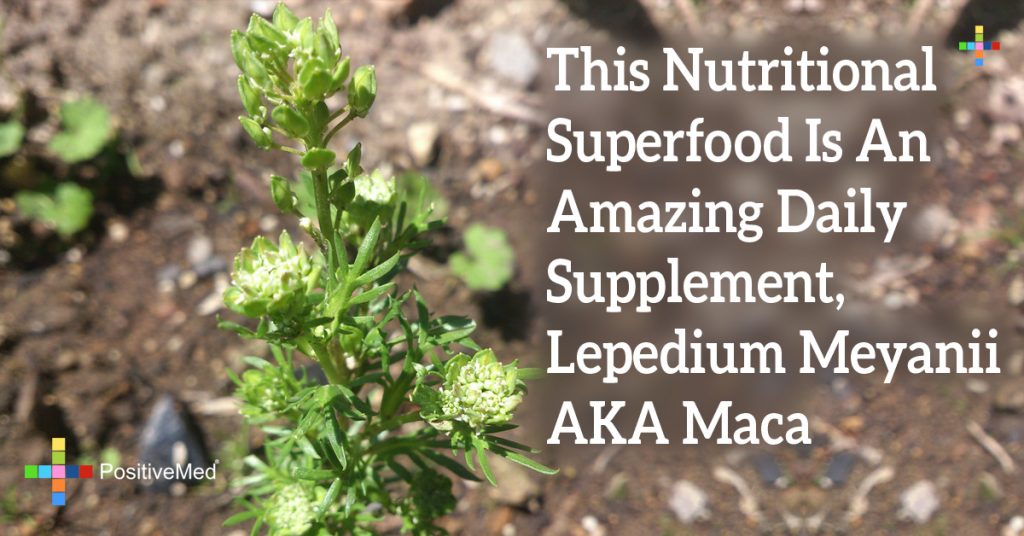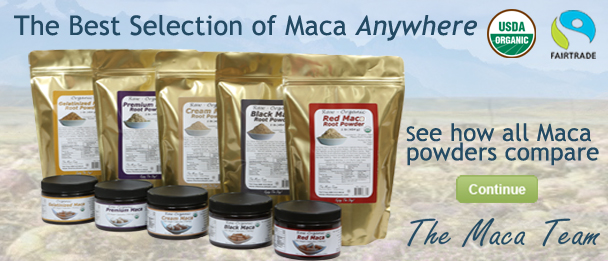
This Nutritional Superfood Is An Amazing Daily Supplement, Lepedium Meyanii AKA Maca

What is Maca (Lepedium Meyenii)?
Lepedium meyenii Walp. (Maca root) was first describd by Gerhard Walpers in 1843. Extensive taxonomic treatments of the species Lepedium found in Australia, and North America, but nothing exhaustive has been produced on the varieties native to Peru. It has also been suggested by Chacon de Popovici (1990) that the current day Lepedium grown in Peru is a newer species than that described by Walpers.
Common names of Lepedium meyenii are: maca, Peruvian ginseng, pepper grass, pepper weed, mace. In Spanish they include, maca and maka. In Quechua and other languages they include: maca, maca-maca, maino, maka, ayak chichira, ayak willku.

Maca Nutritional Facts, In general Maca is rich in amino acids, phytonutrients, fatty acids, vitamin and minerals.
59% carbohydrates – Maca is rich in quality carbs, which, combined with its alkaloids and other nutrients make it a great choice for sustained energy
10.2% protein – Maca is loaded with bio-available plant protein that is easy for the body to assimilate
8.5% fiber – Maca contains relatively high levels of cellulose and lignan, both of which stimulate intestinal function. Fiber is a key component to a healthy digestive and elimination system.
Essential Amino Acids: Maca contains nearly all of them. These drive many cellular functions in the body including physical and fertility functions.
Free Fatty Acids: 20 have been found in Maca. These also work to support cellular function. Saturated acids account for 40% and non-saturated about 55%. The most abundant fatty acids adding to Maca’s nutritional value are linolenic acid, palmitic acid, oleic acid and steric acid.
Vitamins:
Thamin (B1) – 1mg/100g – helps the body convert carbohydrates into energy. Essential for good heart, muscle and nervous system function
Riboflavin (B2) – .76mg/100g – important for body grown and red blood cell production
Ascorbic Acid (C) – – 3mg/100g – supports anit-oxidant activity
Niacin 35mg/100g – supports healthy circulation
Major Minerals
Calcium – 450mg/100g – Maca contains a higher levels of calcium than does milk. Calcium is crucial in bone development as well as for nerve and circulatory system health.
Phosphorus – 220mg/100g – Phosphorus is important for the hemostasis of calcium as well as for transmitting electrical stimuli for brain and muscle action.
Magnesium – 104mg/100g – Magnesium is essential for the synthesis of protein and for muscle and nerve activity. Crucial for heart health.
Potassium – 1500mg/100g – Potassium works within the cells to help maintain healthy osmosis.
Sodium 25mg/100g – Along with potassium can support positive circulation
Minor Minerals
Copper – 5mg/100g – Supports enzyme health.
Zinc – 12mg/100g – Helps in clarity of thought and mental function
Manganese – 8mg/100g – Supports healthy growth
Iron – 25mg/100g – Vital component of hemoglobin. Supports health muscle growth.
Selenium – 20mg/100g – Protects cells against free radicals.
Boron – 5mg/100g – Supports proper metabolism.
Sterols – With regular use sterols may have a positive impact on lowering blood cholesterol. One recent study showed that consuming 1.8 to 2.8 grams of plant sterols and plant stanols per day over a period of 4 weeks to 3 months significantly lowered total cholesterol in participants by 7%-11%
Brassicasterol – 9.1%
Ergosterol – 13.6%
Campesterol – 27.3%
Ergostadienol – 4.5%
Sitoserol – 46.5%
Glucosinolates: Aromatic glucosinolates including: benzyl glucosinolate, p-methoxybenzyl glucosinolate, fructose, glucose, benzyl isothiocyanate. In food-bearing plants, glucosinolates act as natural pesticides and are stored in the plant’s cells, ready to be released upon tissue damage. Similarly, when consumed by humans, the action of chewing releases the glucosinolates into the body, where they are transformed into bioactive compounds believed to have anticancer properties.
Macaenes and macamides: (Macaina 1, 2, 3, 4) These are polyunsaturated acids and their amides which are absolutely unique to Maca
The Maca Nutrition Facts listed above show that Maca a true nutritional powerhouse and amazing daily supplement.
But Maca root, like the Chinese herb ginseng, is also an adaptogen. Adaptogens are substances that raise the physical body’s state of resistance to diseases through physiological and emotional health improvements. This makes Maca a broad based healer with many benefits able to support and rejuvenate overwhelmed, tired adrenal glands eventually resulting in much greater energy, stamina, clarity of mind and spirit, and the ability to handle stress.
One other important note is that scientists have also discovered that due to Maca’s nutritional value, the food has the ability to regulate, support, and balance the hormonal systems of both men and women for optimal function. One of the very great things about Peruvian Maca root is that it is not “gender specific” and works equally well for both men and women.
We hope this article gives you a great overview of Maca nutrition facts and what makes it such a powerful superfood.






